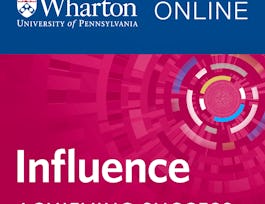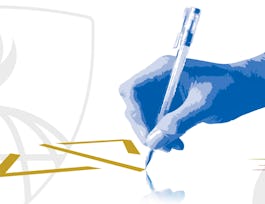This course is about the Research for Impact approach - a set of principles and practices that will help you to make your research more impactful. Traditionally, the goals and outcomes of research projects were to contribute knowledge and communicate this knowledge through academic publications and journal articles. But If we truly want our research to have an impact, we need to do research differently. Research that influences change in policy, practice, behaviour, and attitudes.



(166 reviews)
What you'll learn
Understand the interwoven elements of Research for Impact in the context of development and adaptation research.
Identify the suite of activities involved in Research for Impact to influence change in policy, practice, behaviour, and attitudes.
Appraise opportunities and challenges in your research plan through a Research for Impact lens.
Skills you'll gain
Details to know

Add to your LinkedIn profile
10 assignments
See how employees at top companies are mastering in-demand skills


Earn a career certificate
Add this credential to your LinkedIn profile, resume, or CV
Share it on social media and in your performance review

There are 6 modules in this course
Welcome to Research for Impact. We begin by introducing the Research for Impact approach and its elements. Then we look more closely at the ‘wicked’ problems that this attempts to tackle and the complex systems within which the work takes place. Transdisciplinarity is an important theme in the Research for Impact approach, and so we discuss its role in addressing wicked problems such as climate change adaptation. Chandni Singh and Hillary Masundire share their personal experiences around using the Research for Impact approach to bring change in their communities. We also hear from students, researchers and practitioners speak about how the Research for Impact approach was used in their own research projects.
What's included
10 videos11 readings2 assignments1 discussion prompt
In Research for Impact, we are always working towards some kind of positive change. But how does change happen in complex systems and how can we plan our research activities to bring about this change? This week, Marta Arranz from Oxfam, helps us explore these difficult questions and introduces us to the Theory of Change, Impact Pathways and other tools used for planning. Since projects do not always go to plan, we consider monitoring and evaluation as an important aspect of planning for change. We look at revisiting and adjusting our planned activities as we learn from experiences to improve and increase the impact of our research activities. Mark Tebboth and Alemayehu Zewdie share their experiences of doing research in East Africa and provide us with practical examples of how to plan for impact.
What's included
10 videos6 readings1 assignment1 peer review1 discussion prompt
A key principle of the Research for Impact approach is that we move away from doing research ON people and start doing research WITH people. This encourages us to think carefully about how we can most effectively engage with those affected by, or who may influence the outcomes of our research. How can we develop partnerships that will move us closer to achieving our research goals, and what are the considerations for identifying stakeholders? This week, Daniel Morchain who is the Senior Advisor in Climate Change Adaptation and Resilience at Oxfam leads us though considering these questions and more. We also learn about different methods of engagement and what we can gain from these processes. Daniel also discusses the challenges and opportunities of working with issues of powers and politics and what sensitivities we need to be aware of when engaging with diverse groups of stakeholders. For a more practical perspective, Prince Ansah from the University of Ghana and Chandapiwa Molefe from the University of Botswana, share valuable insights from their experiences working with stakeholders and forming important partnerships to achieve their research goals. As you may have gathered, using the research for Impact approach also comes with challenges and we hear from researchers and practitioners about how they addressed some of these challenges in their own research projects.
What's included
11 videos6 readings2 assignments1 discussion prompt
Different stakeholders have different languages, cultures, and interests and so we need diverse communication approaches in order to effectively communicate with them. In this week, communications expert Prathijna Poonacha Kodira, who is a consultant for the Indian Institute for Human Settlements, explores the process of moving beyond research dissemination and using the information and evidence that we have to deliver impactful messages to various stakeholders. We learn how to develop communications strategies with impact in mind by asking five simple questions: Why, Who, What, How and When. Prathijna also introduces the important roles that knowledge brokers play in ensuring that research findings reach the right people at the right time in a language and format that they can use. This week’s case study is led by Kwasi Appeaning Addo, who demonstrates how using drone footage of floods in Ghana has not only been an effective form of communicating research findings but has also influenced change.
What's included
9 videos6 readings1 assignment1 peer review1 discussion prompt
As a researcher, you are not expected to come with all the knowledge and skills required to facilitate the change you hope to see. On the other hand, your stakeholders and partners may also require additional knowledge and skills in order to contribute to realizing your shared vision. This process of developing these skills for both the researcher and stakeholders is an integral part of the Research for Impact approach, and is called capacity development. This week, our experts Amadou Sidibe, who is an In-Country Scientist for Michigan State University for ICRISAT in Mali, and Edmond Totin, who is a Research Scientist at ICRISAT in Mali, help us to understand the different types and aspects of capacity development and how we go about developing the capacities of ourselves and others. Our case study this week features Renie Thomas who demonstrates how the use of games has aided the development of community members in Maharashtra, India.
What's included
10 videos4 readings2 assignments1 discussion prompt
In the previous weeks, we learnt about the interdependent elements of Research for Impact and the various tools and activities that we can use to implement them into our research processes. In this week, we look at how to align these practices with our goals and how to use these elements to influence key stakeholders to bring about the changes that we and they want to see. We focus on building strategies and developing a good intervention logic to focus on which points of these complex systems we need to influence to ensure that the evidence from our research project is used and valued by our stakeholders to make an impact. For a more practical perspective Adiku Prosper Yaw shares his experience of doing influential research in Ghana and we end off by hearing from researchers and practitioners who share their practical tips about how best to achieve impact through our research activities.
What's included
9 videos6 readings2 assignments1 discussion prompt
Instructors


Why people choose Coursera for their career




Learner reviews
166 reviews
- 5 stars
86.82%
- 4 stars
10.77%
- 3 stars
1.79%
- 2 stars
0.59%
- 1 star
0%
Showing 3 of 166
Reviewed on Jun 30, 2021
A great way to practice research for impact. The activities are really helpful to apply what you have learned in the course.
Reviewed on Apr 4, 2023
The instructors, teachers and researchers show great pedagogic skills.
Reviewed on Jun 21, 2020
It is really helpful for upcoming researchers and practitioners! It changes the view to see an research.
Recommended if you're interested in Social Sciences

Case Western Reserve University

The University of Edinburgh

University of Pennsylvania

Johns Hopkins University

Open new doors with Coursera Plus
Unlimited access to 10,000+ world-class courses, hands-on projects, and job-ready certificate programs - all included in your subscription
Advance your career with an online degree
Earn a degree from world-class universities - 100% online
Join over 3,400 global companies that choose Coursera for Business
Upskill your employees to excel in the digital economy




